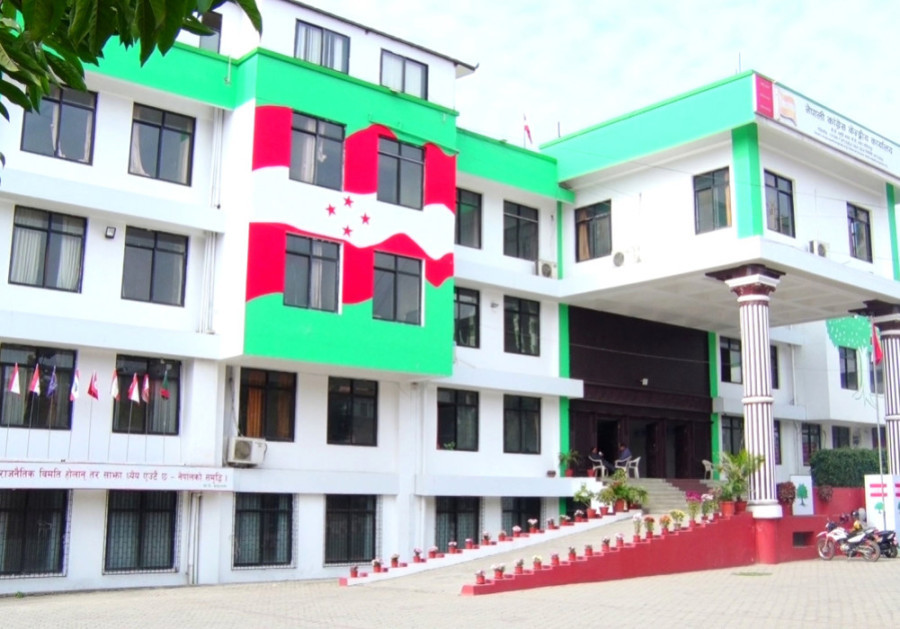Politics
Nepali Congress says it is against all forms of terrorism
Meeting of the largest party discusses ways out of logjams in central bank governor appointment, transitional justice recommendations.
Post Report
The Nepali Congress has said the party is against all forms of terrorism and opposes terrorism in any form.
Speaking to reporters after a meeting of the present and former office bearers of the largest party on Friday, Congress spokesperson Prakash Sharan Mahat reiterated the party’s firm stance against terrorism—in all manifestations.
He added that the party considers actions taken against terrorism as legitimate and supports measures that prevent any form of support or shelter to terrorists.
The comments come amid the ongoing attacks and counter attacks between India and Pakistan triggered by the April 22 terrorist attack in which militants gunned down 26 innocent people including one Nepali national in India’s Jammu and Kashmir.
Mahat expressed hope that growing tensions between India and Pakistan do not escalate into a full-scale war.
“A situation of war has arisen. After the attack on the terrorist base, Pakistan has also retaliated by attacking civilians. Military bases have also been attacked,” he said. “We hope this does not escalate into a full-scale war. We want peace to be restored soon.”
Congress spokesperson Mahat also said that the party considers actions taken against terrorism to be legitimate.
“We have always stood against terrorism. We consider actions taken against terrorism to be justified. We are of the view that no one should support or encourage terrorism,” he said.
He also stated that his party does not want the tension between the two countries to escalate into a full-scale war.
In the meeting, the Congress leaders also discussed the delay in appointment of Nepal Rastra Bank governor and formation of two commissions related to the transitional justice process. The government is under fire for failing to appoint the governor.
The Congress reportedly favoured Gunakhar Bhatta, an executive director of the central bank, as the next governor but his resignation has yet to be approved by Acting Governor Neelam Dhungana.
Dhungana is also in the race for the top post in the central bank. Her reluctance to approve Bhatta’s resignation has made the central bank headless since Maha Prasad Adhikari completed his tenure in the first week of April.
Prime Minister KP Sharma Oli and Nepali Congress President Sher Bahadur Deuba held several rounds of meetings to discuss governor appointment in the past weeks. But they have failed to reach a decision.
At Friday's meeting, Deuba assured his party leaders that the governor will be appointed soon in consensus with coalition partner CPN-UML.
According to Mahat, the party president said the matter will be resolved soon. “We told him that a professional person should become the governor,” Mahat added.
In a recent meeting, Oli and Deuba discussed three different alternatives for the appointment of the governor if Dhungana didn’t approve Bhatta’s resignation.
"The party president said the appointment will be made soon. The leadership of the central bank should be in the hands of a professional and competent individual. He [Deuba] said the decision will be made in consensus,” said Mahat.
If Dhaunaga does not approve the resignation, the government may designate Bam Bahadur Mishra as acting governor so he will approve Bhatta’s resignation, paving the way for his appointment as the next governor.
If that too does not happen, the Congress will find an alternative candidate in a way to ease the process, said a Congress leader. Since Dhungana is also an aspirant for the top post, she has been blocking Bhatta’s chances and complicating the issue for over a month after the incumbent retired.
“Until now, both Oli and Deuba are confident that Bhatta’s resignation will be accepted, and the process of appointing a new governor will proceed. If Bhatta’s resignation is not accepted, the discussion may move towards either replacing the acting governor or proposing a new governor candidate."
An understanding has been reached between Oli and Deuba to appoint Bhatta as next governor but the two leaders have not discussed his alternative.
Mahat said there was a discussion on the need to form the Truth and Reconciliation Commission and the Commission on the Investigation of Enforced Disappearances.
“It is necessary to set up the truth commission. We have finalised the law, but the work has not progressed because the structure is still not ready. We all agree that after discussions with all parties, the process of truth and reconciliation should be concluded in a fair manner.”
The committee formed to recommend office bearers for the two transitional justice commissions is working to pick the names from among the shortlisted candidates.
The two transitional justice bodies were formed in 2015 with a mandate to investigate and prosecute conflict-era crimes within two years.
But the commissions have remained inactive since July 2022 after the then government extended their terms but without retaining their heads and members.
While the truth commission has 63,718 complaints registered, there are around 2,400 cases with the disappearances commission.




 15.12°C Kathmandu
15.12°C Kathmandu














